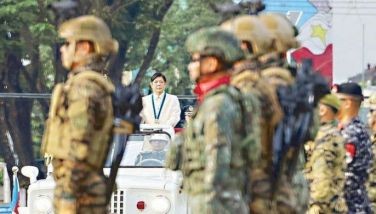Despite time constraints, Palace remains hopeful for BBL passage
MANILA, Philippines – Malacañang is still hoping Congress can pass the Bangsamoro Basic Law even with three session days left before lawmakers go on a break for the campaign period.
“We are coordinating with the leaders of Congress. Let us wait for the statements of Speaker Feliciano Belmonte about this,” Presidential Communications Operations Office Secretary Herminio Coloma Jr. said yesterday.
Coloma issued the statement after Lanao del Sur Rep. Pangalian Balindong, Deputy Speaker for Mindanao in the House of Representatives, declared the BBL could now be considered dead.
Senate President Franklin Drilon also admitted there are no certainties on the approval of the BBL since there are just three session days left before Congress goes on break for the election campaign for the May elections.
“We have three days left. Let’s see. I cannot be certain about that,” Drilon said in a television interview yesterday.
The BBL is a product of 17 years of peace initiatives between the government and the Moro Islamic Liberation Front (MILF).
The BBL needs to be ratified by Congress in order to be implemented as the governing law for the Bangsamoro region by replacing the Autonomous Region in Muslim Mindanao.
The House has ended its period of debates and has started the period of amendments. But the long speeches of lawmakers against the measure have taken much time that the prospects of its passage in the chamber next week are nil. Even if it will pass in the House, it will still have to hurdle the Senate, which has prepared a different version, the Basic Law for the Bangsamoro Autonomous Region (BLBAR).
Balindong made an emotional privilege speech on Wednesday where he blamed the lack of quorum in the past weeks and the lack of interest of most lawmakers that stalled the approval of the measure.
“With a heavy heart and a disturbing sense of foreboding, I close the book of hope for the passage of the BBL,” Balindong said.
Balindong lamented all the 51 public hearings and 200 hours of committee level debates and eight months of public consultations over the BBL were “all put to waste.”
“The BBL was thrown into abyss of uncertainty and darkness. This is the lowest and saddest day of my legislative work,” Balindong said. “Today, we take away the hopes of millions of people in the Bangsamoro. By sheer tyranny of the majority, we have foreclosed all possible peaceful, legal and constitutional avenues for peace,” he said.
Balindong said those opposing the BBL in the House wanted to water it down in the version that he said would be much weaker than the present organic law of the ARMM.
“Maybe political will take the place of a miracle,” he said.
Drilon added the contributing factor that could have stalled approval of the BBL was the Mamasapano incident.
Most lawmakers expressed apprehension over the BBL following the firefight in Mamasapano, Maguindanao where 44 policemen were killed in a gun battle with MILF and other Muslim rebel groups on Jan. 25 last year.
“In fairness to the legislature, we did our best but you can operate only in a political environment conducive to the passage of this bill. Unfortunately, after the Mamasapano incident, the environment became very toxic,” Drilon said.
Drilon conceded the BBL could have been threshed out, with all its constitutional flaws, had the Mamasapano incident not happened.
“I can say that I think the BBL is the 45th victim in Mamasapano,” he said.
Mindset
Balindong and Sulu Rep. Tupay Loong said they had to contend with the apparent anti-Moro “mindset” of most of their lawmaker colleagues, who failed to see that the Moro people – despite being a minority – should “stand in parity of esteem with our Filipino brothers and sisters.”
“No matter how we stand to legal reasoning, no matter how we shout for our constitutionally guaranteed right to genuine political autonomy, the reality is that there are only 10 Moro legislators against the more than 280 members of this house. We are only ten lone voices in the wilderness of bias, prejudice and hatred,” Balindong said.
Balindong and Loong warned of “serious repercussions” in failing to pass the BBL, likely in the resurgence of deadly violence in Mindanao as many young and impatient rebels can use the failure to pass the measure to justify armed struggle.
“What we have not done is a perfect recipe for radicalization. It is a disaster that extremists can easily exploit. I have not been remiss in presenting to you this scenario, but some of us here simply dismissed it as a form of threat,” Balindong said.
“What shall I tell my people when I go back to my homeland? How can I explain to them why we failed to pass the BBL? How can I convince my people to remain steadfast to peace without the BBL? How can the thousands of combatants return to normal life when we did not deliver the basic law that would legalize the establishment of the Bangsamoro?” he asked.
Peace at hand
With the government and MILF deal now seemingly dead, the three-way review of the peace deal with the Moro National Liberation Front (MNLF) opened a new door for yet another venture meant to end the Mindanao conflict.
The MNLF, which is more nationalistic in character and from which the MILF had splintered in the early 1980s, signed the final peace agreement on Sept. 2, 1996.
The Organization of Islamic Cooperation (OIC), the Philippine government and the MNLF concluded in Jeddah, Saudi Arabia early this week the tripartite review of the peace accord, which began in 2007, precipitated by misunderstandings on some of its sensitive provisions.
The three parties to the review of the peace accord – the OIC, Malacañang and the MNLF – had agreed to establish the Bangsamoro Development Assistance Fund for socio-economic initiatives in Moro enclaves; focus on co-management of strategic mineral wealth, and let former rebel leaders participate in the setting up of an MILF-led Bangsamoro parliament.
The parties also reached a consensus to establish a tripartite committee that would monitor the efforts of pushing forward all of the agreements crafted during the eight-year review process.
Former Cotabato City mayor Muslimin Sema, leader of one of the three factions in the MNLF, said there is now clarity on how their group, the MILF and Malacañang are to converge to achieve a common peace blueprint for Mindanao.
The OIC wants a convergence of the separate government-MILF and government-MNLF peace overtures to hasten the attainment of peace and development in conflict-stricken southern towns and provinces. – With Paolo Romero, Christina Mendez, John Unson, Jose Rodel Clapano
- Latest
- Trending

































